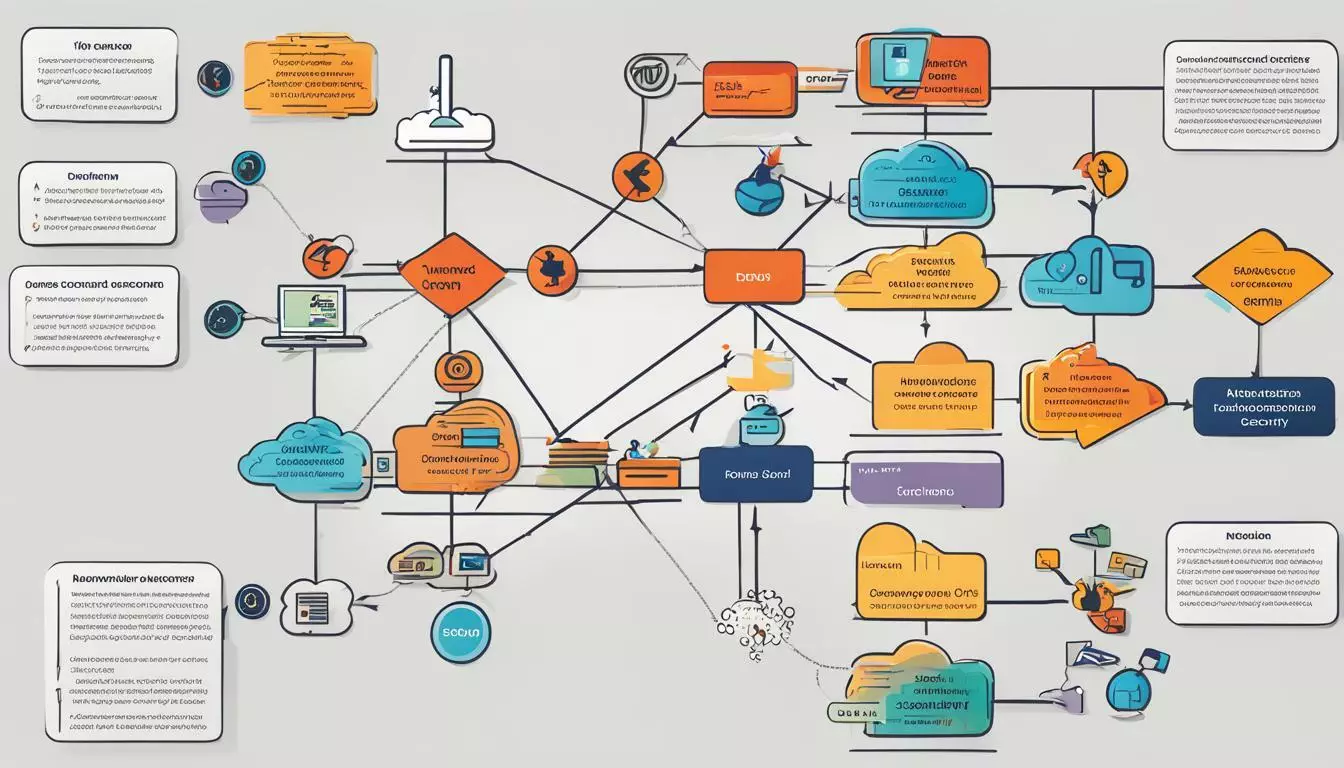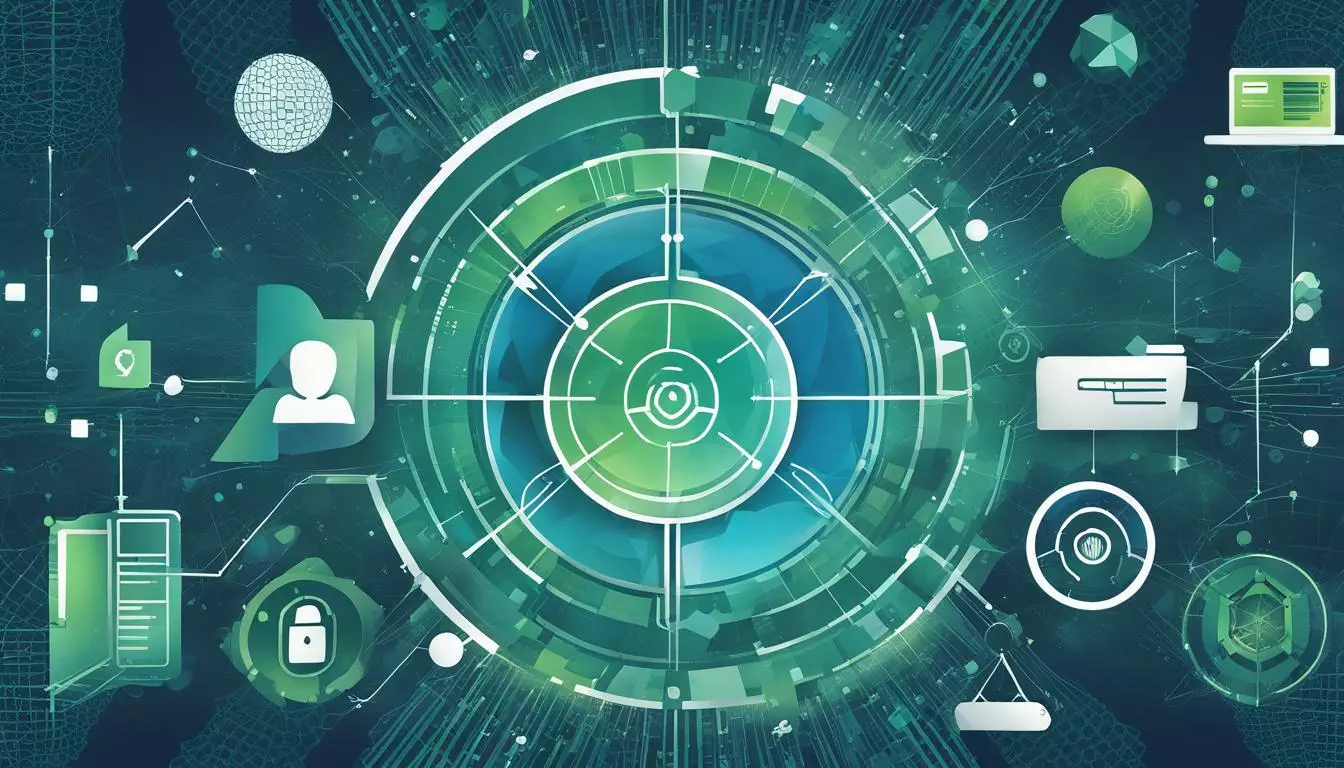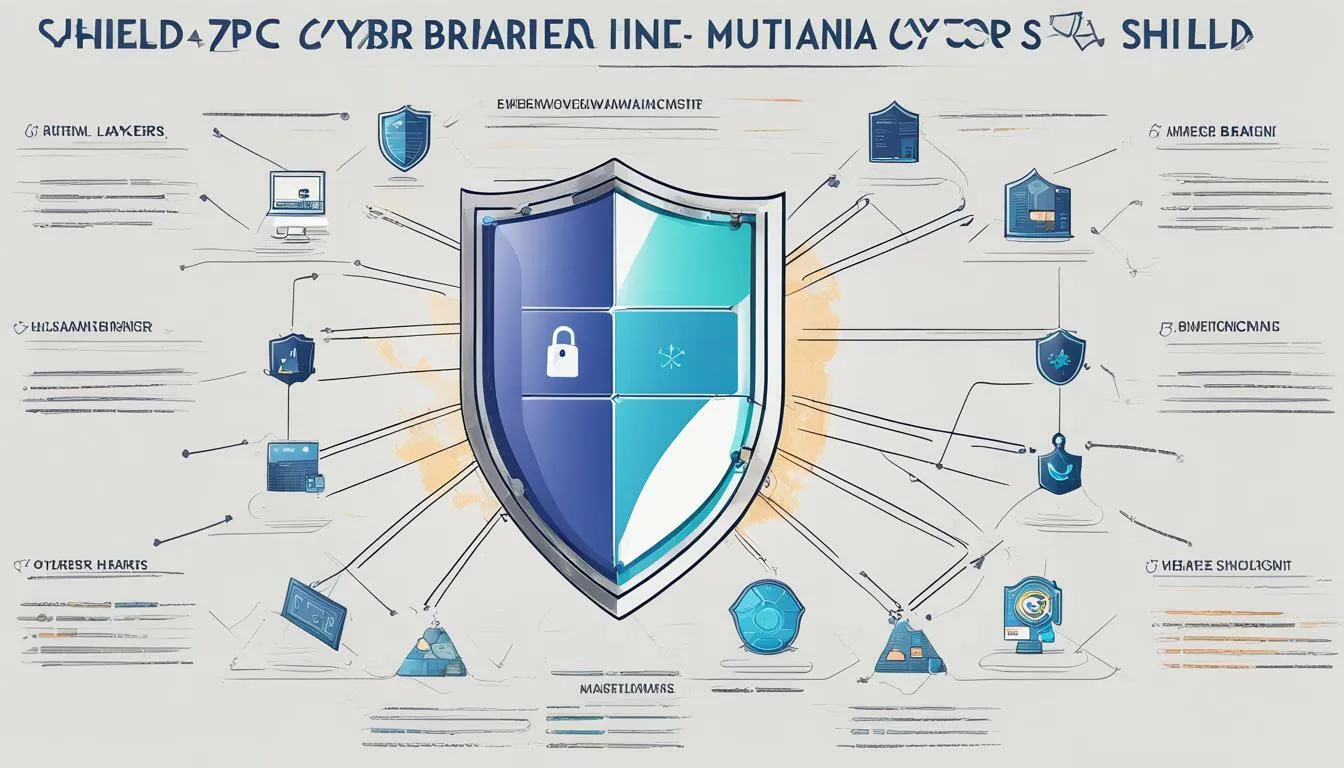Key Takeaways:
- Domains in cyber security refer to the different categories that cyber security covers.
- Each domain requires specialized knowledge and expertise to manage and secure.
- Domain names serve as unique identifiers for digital assets and play a critical role in cyber security.
The Importance of Domains in Cyber Security
As a journalist specializing in cyber security, I cannot stress enough the criticality of domain security for any organization’s overall cyber security posture. Domains serve as the cornerstone of the digital identity of any entity on the internet, such as websites, applications, email servers, and more. They are essential for establishing a brand and facilitating online communication and commerce. However, domains are also prime targets for cyber attacks, such as domain hijacking, DNS poisoning, and phishing attacks. A compromised domain can lead to severe consequences, including data breaches, loss of confidential information, financial losses, reputational damage, and legal liabilities. Therefore, ensuring domain security is crucial for protecting digital assets and maintaining trust with customers and stakeholders. Effective domain security practices involve a combination of technical, operational, and administrative measures. These include implementing secure domain name server (DNS) protocols, using strong domain passwords, keeping domain-related software updated and patched, monitoring domain activity for suspicious behavior, and conducting regular domain audits. Moreover, domain security must be an integral component of an organization’s overall cyber security strategy. It requires proactive risk management, continuous monitoring, and regular review and update of policies and procedures. Without a strong domain security strategy, organizations are exposed to various cyber threats that can have severe consequences.
At the same time, it is crucial to recognize that the cyber security threat landscape is continually evolving, and domain security measures must adapt to keep pace. Organizations need to stay informed of emerging threats, new technologies, and best practices and ensure that their domain experts are continually updating their domain security skills and knowledge.
Domains play a critical role in cyber security, and domain security is a fundamental aspect of protecting digital assets. Organizations that prioritize domain security as part of their overall cyber security strategy can mitigate the risks associated with cyber threats and establish trust with customers and stakeholders.
Moreover, domain security must be an integral component of an organization’s overall cyber security strategy. It requires proactive risk management, continuous monitoring, and regular review and update of policies and procedures. Without a strong domain security strategy, organizations are exposed to various cyber threats that can have severe consequences.
At the same time, it is crucial to recognize that the cyber security threat landscape is continually evolving, and domain security measures must adapt to keep pace. Organizations need to stay informed of emerging threats, new technologies, and best practices and ensure that their domain experts are continually updating their domain security skills and knowledge.
Domains play a critical role in cyber security, and domain security is a fundamental aspect of protecting digital assets. Organizations that prioritize domain security as part of their overall cyber security strategy can mitigate the risks associated with cyber threats and establish trust with customers and stakeholders.
Understanding Cyber Security Domains
In the realm of cyber security, domains refer to distinct areas of digital asset protection. These domains can encompass various aspects of cyber security, including network security, application security, cloud security, and more. Each domain requires specialized knowledge and unique considerations, making it essential to understand the different cyber security domains and their functions. Cyber security domains are interconnected, with vulnerabilities in one domain potentially leading to consequences in another. For example, a weakness in network security can expose an organization’s applications or cloud storage to potential cyber threats. Therefore, it is crucial to take a comprehensive approach to cyber security, considering all domains and their interrelations. The various cyber security domains each have unique challenges and considerations. Network security, for instance, focuses on protecting an organization’s network infrastructure from potential threats such as unauthorized access or data theft. On the other hand, application security emphasizes the security of an organization’s software systems against cyber threats. Similarly, cloud security concerns with the protection of an organization’s cloud storage and computing platforms from external and internal threats. It is worth noting that cyber security domains are continually evolving, with new domains emerging alongside emerging technologies and emerging threats. As such, cyber security experts must stay up-to-date with the latest developments to maintain effective domain management practices. Overall, understanding the different domains within cyber security is an essential step in developing a comprehensive security strategy. Organizations must consider each domain’s unique challenges and implement appropriate measures to ensure protection across all domains.
Overall, understanding the different domains within cyber security is an essential step in developing a comprehensive security strategy. Organizations must consider each domain’s unique challenges and implement appropriate measures to ensure protection across all domains.
The Significance of Domain Names in Cyber Security
Domain names play a critical role in the realm of cyber security. They identify and provide access to digital assets, such as websites, email servers, and databases. However, they can also be exploited by cybercriminals for malicious purposes, such as phishing attacks and impersonation. Therefore, domain protection is essential in ensuring the overall security of digital assets. One of the primary risks associated with domain security vulnerabilities is phishing attacks. Cybercriminals use domain names to trick individuals into providing sensitive information, such as login credentials or financial data. These attacks can be difficult to detect, as they often involve sophisticated social engineering tactics that mimic legitimate websites or communications. To mitigate the risks associated with domain names, various security measures can be implemented. One such measure is domain privacy, which shields personal information associated with a domain from the public eye. Another is multi-factor authentication, which requires more than one piece of information to access a domain, making it more challenging for cybercriminals to gain unauthorized access. Additionally, it is crucial to regularly monitor and protect domain names against domain hijacking and DNS attacks. Domain hijacking involves stealing a domain name from its rightful owner and transferring it to a different registrar, while DNS attacks exploit vulnerabilities in the Domain Name System (DNS) to redirect users to fake websites or intercept sensitive information. Overall, it is essential to protect domain names through various security measures to ensure the safety of digital assets. By implementing strong domain management practices and staying vigilant against cyber threats, individuals and organizations can safeguard against potential vulnerabilities and protect their digital assets.
Domain Management in Cyber Security
Effective domain management is a crucial aspect of cyber security. It involves the processes and practices of managing domain registrations, monitoring domain activity, and ensuring compliance with industry standards. One of the key considerations in domain management is domain reputation. This refers to the perceived trustworthiness and credibility of a domain by search engines and other digital entities. Maintaining a positive domain reputation is essential for ensuring that emails and other communication sent from your domain are delivered to their intended recipients. Another important aspect of domain management is monitoring for potential security threats. This involves regularly checking for any abnormal activity, such as unauthorized changes to DNS records or suspicious login attempts. By monitoring domain activity, organizations can detect and respond to potential threats before they can cause significant damage. Ensuring the timely renewal of domain registrations is also a critical aspect of domain management. Failing to renew a domain in a timely manner can result in the loss of the domain name, which can have significant implications for a business or organization. To effectively manage domains, it is important to have a comprehensive domain management plan in place. This plan should outline the necessary procedures and protocols for domain registration, renewal, monitoring, and more. It should also assign responsibilities to specific individuals or teams to ensure accountability and coordination. By prioritizing domain management as a key aspect of cyber security, organizations can proactively protect their digital assets against potential threats and ensure the effective management and use of their domain names.
Safeguarding Domains Against Cyber Threats
In today’s interconnected digital world, domains are the backbone of online operations. Unfortunately, they are also highly targeted by cybercriminals for various nefarious activities. As attackers become increasingly sophisticated, it is crucial to implement robust domain protection measures to safeguard against the growing number of cyber threats. Domain Protection in Cyber Security involves securing domain names and the digital assets associated with them from unauthorized access, modification, or theft. Given the high stakes involved, it is imperative to stay informed of the current cyber threat landscape and implement proactive measures to protect domains. One of the most significant threats to domains is domain hijacking, where unauthorized parties gain control of domains through various means such as phishing, social engineering, or exploiting vulnerabilities in domain management systems. Such attacks can have severe consequences, including loss of control over the domain, damage to brand reputation, and financial losses.
Another common threat is DNS attacks, which target the Domain Name System (DNS) infrastructure that translates domain names into IP addresses. Such attacks can lead to domain name resolution failures, redirection of traffic to malicious sites, or even complete denial of service.
Domain squatting is another significant threat to domains, where cybercriminals register domain names that are similar to existing ones with the intent of impersonation or phishing. Such attacks can lead to confusion among users and cause reputational damage to companies.
Implementing Domain Protection in Cyber Security involves adopting various measures to mitigate these and other threats. For instance, using multi-factor authentication, DNSSEC, and domain privacy can protect against domain hijacking and DNS attacks. Additionally, conducting regular domain audits, choosing strong domain passwords, and regularly updating and patching domain-related software can protect against various domain threats.
It is essential to ensure that domain security measures are integrated into overall cybersecurity strategies to ensure a comprehensive approach. This includes staying informed of emerging threats, continuously monitoring domain health, and utilizing domain expertise to strengthen security posture.
Domain Protection in Cyber Security is essential for any organization that relies on domains for their online presence. By implementing robust domain security measures, organizations can protect their digital assets and maintain trust with their customers.
One of the most significant threats to domains is domain hijacking, where unauthorized parties gain control of domains through various means such as phishing, social engineering, or exploiting vulnerabilities in domain management systems. Such attacks can have severe consequences, including loss of control over the domain, damage to brand reputation, and financial losses.
Another common threat is DNS attacks, which target the Domain Name System (DNS) infrastructure that translates domain names into IP addresses. Such attacks can lead to domain name resolution failures, redirection of traffic to malicious sites, or even complete denial of service.
Domain squatting is another significant threat to domains, where cybercriminals register domain names that are similar to existing ones with the intent of impersonation or phishing. Such attacks can lead to confusion among users and cause reputational damage to companies.
Implementing Domain Protection in Cyber Security involves adopting various measures to mitigate these and other threats. For instance, using multi-factor authentication, DNSSEC, and domain privacy can protect against domain hijacking and DNS attacks. Additionally, conducting regular domain audits, choosing strong domain passwords, and regularly updating and patching domain-related software can protect against various domain threats.
It is essential to ensure that domain security measures are integrated into overall cybersecurity strategies to ensure a comprehensive approach. This includes staying informed of emerging threats, continuously monitoring domain health, and utilizing domain expertise to strengthen security posture.
Domain Protection in Cyber Security is essential for any organization that relies on domains for their online presence. By implementing robust domain security measures, organizations can protect their digital assets and maintain trust with their customers.
The Role of Domain Experts in Cyber Security
As a professional copywriting journalist with expertise in cyber security, I cannot stress enough the significance of domain expertise in this field. Cyber security domains encompass a wide range of areas, including network security, application security, cloud security, and more. Each domain requires specialized knowledge and skills to navigate the unique challenges and considerations associated with it. Domain experts play a critical role in enhancing overall security posture by providing insights and strategies to effectively manage and protect digital assets. They possess a deep understanding of the latest threats and vulnerabilities, as well as the most current domain management practices and technologies. This knowledge can be leveraged to implement proactive measures to mitigate risks and respond to incidents. Moreover, domain experts are an invaluable resource for organizations seeking to build and maintain a strong cyber security program. Their expertise can inform decision-making and ensure the alignment of domain management practices with industry standards and regulations. By engaging with domain experts, organizations can stay ahead of the curve and ensure their digital assets remain secure. However, it is important to note that cyber security is a rapidly evolving field, and domain experts must continuously learn and stay updated on the latest trends and developments. This requires a commitment to ongoing education and staying informed about the latest threats and best practices in domain security. Overall, the expertise of domain professionals is an indispensable asset in the fight against cyber threats. With their specialized knowledge and skills, they can provide organizations with the guidance and resources they need to ensure a robust and effective domain security strategy.
Overall, the expertise of domain professionals is an indispensable asset in the fight against cyber threats. With their specialized knowledge and skills, they can provide organizations with the guidance and resources they need to ensure a robust and effective domain security strategy.
Best Practices for Domain Security
Ensuring domain security is a critical aspect of overall cyber security. Implementing best practices for domain protection can help prevent cybercriminals from gaining access to sensitive information and compromising digital assets. Here are some practical recommendations for strengthening your domain security:- Choose strong domain passwords: Select unique, complex passwords that are difficult to guess or crack. Use a combination of letters, numbers, and special characters.
- Update and patch domain-related software regularly: Keep all software and applications associated with your domain up-to-date with the latest security patches to help prevent vulnerabilities.
- Implement secure DNS practices: Use DNSSEC (Domain Name System Security Extensions) to authenticate DNS responses and protect against DNS attacks.
- Conduct regular domain audits: Regularly review your domain name portfolio to ensure that all domains are registered, monitored, and renewed correctly, and are in compliance with industry standards.
| Image alt text: Domain Protection in Cyber Security |
|---|
 |
The Future of Domains in Cyber Security
In the rapidly evolving landscape of cyber security, domains will continue to play a critical role in securing digital assets. With the increasing use of cloud services and the Internet of Things (IoT), the number of domains and potential attack surfaces will continue to expand. As a result, organizations will need to focus on developing domain security strategies that are comprehensive, proactive, and adaptable. Emerging threats such as AI-driven attacks and quantum computing pose new challenges to domain security. AI-driven attacks have the potential to exploit domain vulnerabilities at scale, while quantum computing threatens to render traditional encryption methods obsolete. As a result, domain experts will need to stay abreast of these developments and work to develop new approaches to domain security. At the same time, advancements in domain security technologies offer new opportunities for organizations to improve their domain security posture. For example, advances in blockchain technology have the potential to enhance domain name system (DNS) security by creating a decentralized and more secure system for domain registration and management. Additionally, machine learning and artificial intelligence (AI) can be used to improve domain threat detection and response. In terms of domain management, organizations will need to focus on integrating domain security into their broader cyber security strategies. This will involve taking a holistic approach to domain management that includes regularly monitoring domains for potential vulnerabilities, implementing secure domain registration and renewal practices, and training employees on domain security best practices. Domains will remain a critical component of cyber security in the years to come. As the cyber landscape continues to evolve, organizations must remain vigilant in their efforts to protect their digital assets. By staying informed about emerging threats and advancements in domain security technologies, and taking proactive measures to safeguard their domains, organizations can ensure that their domain security strategies remain effective and adaptive in the face of new challenges.
Domains will remain a critical component of cyber security in the years to come. As the cyber landscape continues to evolve, organizations must remain vigilant in their efforts to protect their digital assets. By staying informed about emerging threats and advancements in domain security technologies, and taking proactive measures to safeguard their domains, organizations can ensure that their domain security strategies remain effective and adaptive in the face of new challenges.
How Can I Incorporate My Understanding of Domains in Cyber Security into My LinkedIn Profile for Career Growth?
My LinkedIn profile serves as a stage for showcasing my expertise in cyber security through a smart exhibition of strategies. Highlighting my understanding of cyber security domains can significantly enhance my professional allure. The intricately designed cyber security tactics on my LinkedIn profile are poised to pique the interest of talent seekers, including recruiters and employers on the hunt for specialists in this arena.
What Are the Main Domains Covered in Indian Call Centers?
Indian call centers provide a wide range of services across various domains. These call centers in india cater to industries such as telecommunications, banking and finance, retail, healthcare, travel, IT support, and customer service. With skilled agents and multilingual capabilities, these Indian call centers offer efficient and cost-effective solutions to businesses worldwide.
Ensuring a Strong Domain Security Strategy
As we have seen throughout this article, domains play a critical role in cyber security. Protecting your domain names and managing them effectively is crucial for securing your digital assets. It is important to understand the potential risks associated with domains and take proactive measures to mitigate them. Developing a robust domain security strategy is a key component of overall cyber security. This means implementing best practices, such as using strong domain passwords, regularly updating and patching domain-related software, implementing secure DNS practices, and conducting regular domain audits. By prioritizing domain security, you can significantly reduce the likelihood of falling prey to cyber attacks. It is essential to ensure that your domain security strategy aligns with industry standards and is updated to reflect the latest cybersecurity developments. Remember, your domain names are valuable assets that need to be protected. By investing in domain protection, you are securing your online presence and safeguarding against potential cyber threats. As the cyber landscape continues to evolve and threats become increasingly sophisticated, it is more important than ever to ensure a strong domain security strategy. By prioritizing the importance of domains in cyber security, you can safeguard your online assets and protect your business or personal information from potential attacks.
As the cyber landscape continues to evolve and threats become increasingly sophisticated, it is more important than ever to ensure a strong domain security strategy. By prioritizing the importance of domains in cyber security, you can safeguard your online assets and protect your business or personal information from potential attacks.

